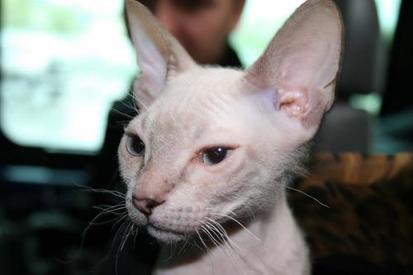
This distinct breed was first seen in Russia in 1987. Intrigued by a bag that appeared to be moving, being kicked around by a group of boys in the city of Rostov-on-Don; Elena Kovaleva opened it to find a small, partially hairless kitten inside. Taking the kitten home, Elena noticed that as it got older, all of the cat’s remaining hair began to fall out. In order to retain this hairless trait, Elena selectively bred the hairless offspring of her cat and named the new breed ‘Don Sphynx.’ The International Cat Association officially recognised the unique breed in 2005 and registered it under the name ‘Donskoy.’
Similar in appearance and structure to the Sphynx, the Donskoy is highly distinctive and not easily mistaken for any other breed. The Donskoy is a medium-sized cat with long legs, a muscular body structure, a small, wedge-shaped head, large ears and characteristic webbed toes. The hairlessness of the breed requires careful attention, as despite not needing to be groomed, the Donskoy skin is very much like human skin and needs bathing at regular intervals. Being naked means the Donskoy is temperature sensitive, requiring a warm coat in winter months and an application of sun cream during the summer in order to avoid sunburn. It is recommended that these hairless cats are indoor-only pets and do not venture outside unless in a secure enclosure or cornered-off area.
Breeders, owners and enthusiasts have described the Donskoy as an even-tempered cat with a balanced personality, making it a wonderful breed choice for families or a dedicated sole owner. A typical Donskoy is affectionate, inquisitive and intelligent, benefiting from both physical and mental enrichment in its everyday life. Gentle and tolerant towards children and other house pets, the Donskoy displays a calm demeanour the majority of the time, without displaying undue shyness or aggression. Otherwise, the breed is active, animated and highly sociable, engaging well with people and showing an interest in activities around the home. On average, a healthy adult Donskoy will weigh 8-10 pounds, with a life expectancy of roughly 12-15 years.
The Donskoy is typically very healthy and besides skin complaints that can arise from too infrequent/too frequent bathing, and sun damage, the Donskoy is not prone to any known genetic diseases or breed-specific afflictions. One thing the breed is susceptible to is tooth decay and gum disease, so observing good dental hygiene practices is essential.
Do you own a Donskoy/Don Sphynx? Let others know what they're like!
Related products
Advantage 80 Spot On Flea Control Large Cats and Rabbits
from £12.95
Advantage 40 Spot On Flea Control Cats, Small Dogs and Rabbits
from £12.95
Advantage 250 Spot On Flea Control Large Dog
from £12.95
Advantage 100 Spot On Flea Control Medium Dog
from £12.95
Drontal Tasty Bone Wormer Tablets for Small & Medium Dogs (2 to 20kg)
from £2.15
TermaWorm™ Tablets for Cats & Dogs
from £1.79
Drontal Tasty Bone XL Wormer Tablets for Large Dogs (Over 20kg)
from £6.39
Advantage 400 Spot On Flea Control Extra Large Dog
from £12.95